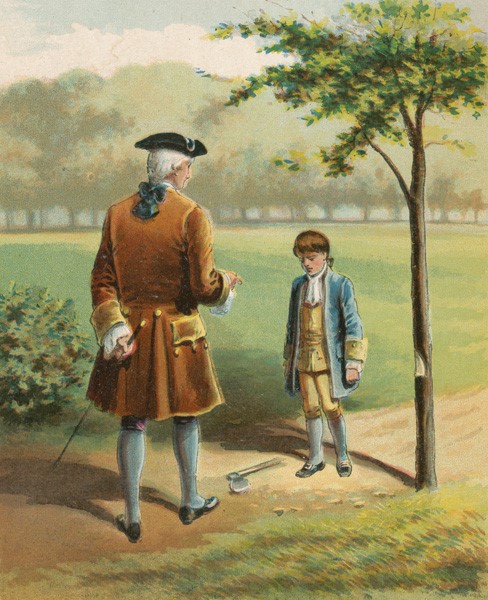
Throughout July we’re taking an in-depth look at Proverbs, the Bible’s one-of-a-kind book about our never-ending need for wisdom.
George Washington and the Cherry Tree is one of the signature stories from America’s earliest days.
Its most familiar rendering is found in a book by Mason Locke Weems that has this imposing title: Life of George Washington: With Curious Anecdotes, Equally Honourable to Himself and Exemplary to His Young Countrymen.
Six-year-old George is caught red-handed, which is to say axe-in-hand, by his father Augustine, who has noticed that a mortal slice has been taken out of one of his favorite cherry trees. Does George happen to know anything about this?
Weems writes: “Looking at his father, with the sweet face of youth brightened with the inexpressible charm of all-conquering truth” [warning: saccharine overload approaching] he bravely called out: ‘I can’t tell a lie, Pa; you know I can’t tell a lie. I did cut it with my hatchet.’ ‘Run to my arms, you dearest boy,’ cried his father in transports, ‘run to my arms; glad am I, George, that you killed my tree; for you have paid me for a thousand fold. Such an act of heroism in my son, is more worth than a thousand trees…’”
Weems’ book, which was published in 1806, became a national bestseller, going through 20 editions. It is one of the chief reasons that cherry concoctions became associated with February 22, Washington’s birthday.
Likewise, the story became a powerful mandate for generations of children: Tell the truth. Always tell the truth. If the Father of Our Country did not tell a lie, then I should not tell a lie. Case closed.
The only problem is that the story almost certainly didn’t happen. Weems appears to have made it up.
Social historian Bill Bryson comments that Weems, who called himself Parson Weems, was “not just a fictionalizer of rare gifts but a consummate liar.” Virtually everything in his biography of Washington was either invented or extravagantly embellished. That includes his memorable descriptions of Washington’s impassioned prayers during the colonial army’s difficult days at Valley Forge.
Even the title page was misleading. Weems identified himself as the “Rector of Mount-Vernon Parish.” But no such parish has ever existed. I mean, dude, are you really pretending to have been George Washington’s pastor?
Weems apparently felt it would be a good idea to make up stories to teach children that it is fundamentally wrong to make up stories.
The human race has a lying problem. A very serious lying problem. According to a study overseen by University of Massachusetts professor Robert Feldman, people tell 3.3 lies during an average 10-minute conversation. Other studies have revealed that we are lied to approximately 200 times a day. Author Ralph Keyes declares that “some form of deception occurs in nearly two-thirds of all conversations.” Some 59% of American parents admit to lying to their children on a regular basis (“McDonalds is closed today”) even though those same parents tell their children that bending the truth is wrong and have no tolerance when their kids lie to them.
According to author James Bryan Smith, HR experts estimate that approximately 25% of the information that appears on resumes is not just “padding” but “gross misinformation.” Investigators estimate that lies told by auto mechanics compel American consumers to cough up some $40 billion annually for unnecessary repairs.
There is no question that way too many of us believe that we have to lie in order to get by.
Why do we do it?
No one can claim it’s OK to shade the truth because the Bible’s ethical standards are ambiguous. Proverbs is uncompromising in its call for truth-telling. “Lying lips are an abomination to the Lord.” (12:22) “A truthful witness saves lives, but one who breathes out lies is deceitful.” (14:25) “Like a madman who throws firebrands, arrows, and death is the man who deceives his neighbor and says, ‘I am only joking!’” (28:18-19)
Almost all lying comes down to impression management. We don’t like the way things are. So, whether through impulse or intention, we propose alternate realities.
How are you today? I’m fine. (Actually, I don’t want to tell you how I really feel). Why were you late? The traffic was murder. (In truth, I didn’t plan very well). How’s your drinking these days? I’m cuttingback. (There’s no way anybody’s going to find out how much I’m struggling). Is the project on target? We’re doing great. (I’m scared to death we’re in the middle of a disaster). What are you thinking about right now? Nothing. (I’m so ashamed I wouldn’t tell you in a million years).
Then there are the ways we try to do impression management on behalf of Jesus.
So, you believe in God? I do. And ever since I surrendered my heart to Christ I’ve known this supernatural peace that just won’t quit.
To tell the truth, however, I don’t know a single Christian who has experienced never-ending peace. And that includes me.
Church people are tempted to do for Jesus what Parson Weems tried to do for George Washington. But the reputation of America’s first president didn’t need to be enhanced by made-up stories. And the cause of the One who called himself the Way, the Truth, and the Life won’t be advanced by our dressing up our own spiritual experiences.
The apostle Paul says in Ephesians 4:15 that we are to “speak the truth in love.” We must abandon lies. With God’s help we must become truth-telling, reality-reporting people.
But love is what should lead us, with wisdom and discernment, to speak with caution. With humility. With grace.
And frankly – if we’re really wise – to stop speaking altogether when silence would clearly be an improvement.
